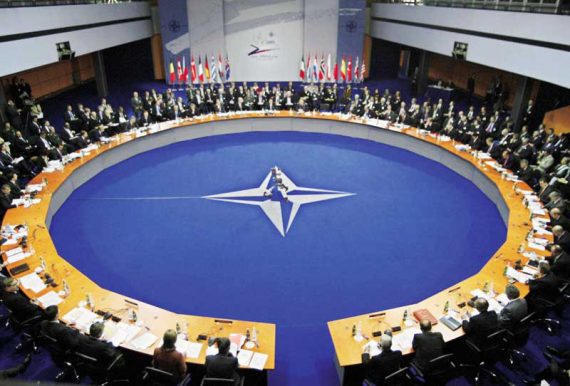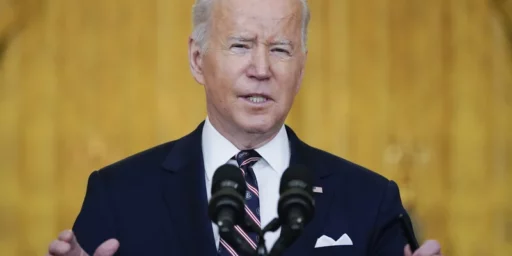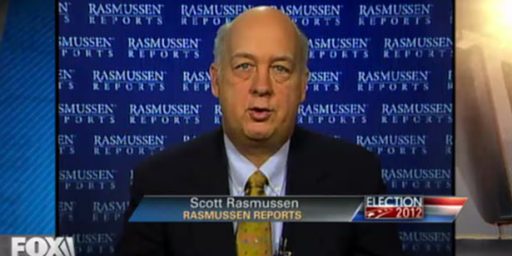NATO Plans New Deployments In Response To Russia
NATO seems intent on sending a signal to Vladmir Putin that there are limits to his patience.
More signals from NATO that we may see some movement of resources in response to recent events in Ukraine:
BRUSSELS — The head of NATO pledged on Wednesday to immediately step up military patrols along the alliance’s vast eastern border in response to mounting evidence of Russian interference in Ukraine.
The announcement by Anders Fogh Rasmussen, the secretary general of the North Atlantic Treaty Organization, appeared to be another sign that the confrontation with Russia over Ukraine was becoming more acute. But Mr. Rasmussen emphasized that the move was designed to be a deterrent rather than preparation for conflict.
“Our decisions today are about defense, deterrence and de-escalation,” Mr. Rasmussen said in a statement posted on the NATO website. “NATO will protect every ally and defend against any threat against our fundamental security,” he said.
Even so, the moves represent a significant strengthening of NATO’s posture in a region where it is already operating an air-policing mission in the Baltic states and surveillance flights over Poland and Romania.
Mr. Rasmussen said the decision on Wednesday meant that aircraft will fly more sorties over the Baltic region and that allied ships will deploy to the Baltic Sea, the eastern Mediterranean and elsewhere, as required.
In addition, military personnel will deploy “to enhance our preparedness, training and exercises,” he said. “We will have more planes in the air, more ships on the water, and more readiness on the land,” he said.
The measures will be implemented “straight away,” he said, and “more will follow, if needed, in the weeks and months to come.”
As I stated earlier this week, it seems to me that NATO is almost required to take some steps like this in response to what we’re seeing from the Russians in the wake of the Crimean Annexation. Getting directly involved in the Ukraine matter, even to the limited extent of providing arms to the Ukrainians, strikes me as unwise for many reasons, however we do need to take into account the probability that Western responses, or the lack thereof, to what Russia may or may not have planned for Eastern Ukraine and what happened in Crimea could lead Putin to believe that the world will not care much if he expands his reach to other parts of Eastern Europe that may be of “interest” to Russia. We’ve already seen some indications of events similar to what has happened in eastern Ukraine unfolding in the Transnistria region of Moldova, and some Russian legislators have said the nation needs to look out for the ethnic Russian citizens of Estonia, which just so happens to be a NATO ally. Allowing Putin to continue making moves like this without making it clear in some way that there are limits to what he’ll be allowed to get away with would potentially lead him and others in Russia to think that they can continue trying to redraw the map of Eastern Europe without consequence. That wouldn’t be in anyone’s interest, including ours.
Of course, all of this talk about NATO movements is making the continent just a bit nervous:
The announcement that NATO was strengthening its presence in Eastern Europe heightened nerves about Ukraine across all of Europe.
While officials did not want to speak on the record, the announcement fed palpable doubts about whether four-way talks scheduled for Thursday in Geneva — bringing Russia and Ukraine to the same table for the first time since February, with the United States and European Union joining in — would proceed as planned.
Germany, which has Europe’s strongest economy and is the most important European trading partner for Russia, was at pains ahead of the scheduled meeting to stress that the Continent spoke with one voice on sanctions against Russia.
Chancellor Angela Merkel of Germany and other leaders here have for weeks made it clear that they will go along with tougher sanctions, while cautioning behind closed doors that a serious rupture in business and other ties could take years to heal.
Germany depends on Russia for up to 40 percent of its natural gas.
Ms. Merkel and President Vladimir V. Putin of Russia talked by telephone on Tuesday evening, according to statements from both governments. In Berlin, a government spokesman, Georg Streiter, underlined that the two leaders did not necessarily come to any meeting of the minds, let alone a shared assessment that Ukraine, as Mr. Putin was quoted as saying, verged on the brink of civil war.
Instead, Mr. Streiter said, it will be “very important” for Russia to withdraw its forces from the border with eastern Ukraine and to tone down its rhetoric on the crisis there.
The fact that the Russians haven’t moved as quickly in response to the events in eastern Ukraine as they did in Crimea may be an indication that they aren’t quite as intent on grabbing territory there as some of their rhetoric suggests. After all, annexing portions of eastern Ukraine into Russia would be a significant escalation of any already tense situation in a way that the annexation of Crimea was not, largely due to the fact that Russia’s historical, strategic, and military claims in Crimea were much more substantial than they are elsewhere in Ukraine. Because of this, it’s possible that what Putin is actually looking for here are political and other concessions from the Ukrainians rather than additional territory that he would immediately have to worry about defending. This could involve additional autonomy for ethnic Russians in Ukraine, agreements from Ukraine and the west that the nation will remain essentially neutral, or a combination of both. This isn’t to discount the possibility that negotiations could fall apart and Russian tanks could start rolling west, but it’s worth keeping in mind that what we’re seeing in public may not be the whole story. In the meantime, though, it seems advisable for the West to make clear to Putin that his reach may end up exceeding his grasp.







Putin is quite likely with his blundering to bring on a civil war which, inevitably, will bring yet more potential terrorists to his borders, not to mention refugees.
Putin panicked in Crimea and ended up leaving Ukraine ever more favorably-inclined to the West. So now he has to dismember Ukraine further, which increases the dangers to him and to the rest of the world. He’s a reckless, foolish politician trading short-term domestic political boosts for long-term damage to his own country. (Thank God we don’t have politicians like that, am I right?)
The fact that the Russians haven’t moved as quickly in response to the events in eastern Ukraine as they did in Crimea may be an indication that they aren’t quite as intent on grabbing territory there as some of their rhetoric suggests.
I haven’t heard much Russian rhetoric about plans to invade or annex eastern Ukraine; everything I’ve heard about such alleged plans is from American, British, Ukrainian, and NATO leaders. The Russians have, in fact, been steadily saying that they’ve no interest in doing so (although I’ve no doubt they’d intercede if ethnic Russians are intentionally and specifically targeted with violence).
@michael reynolds: Given how often I’ve agreed with your opinions and comments in the past, I’ve been astonished at how positively Pavlonian your reactions have been to the Russian response re Ukraine. No Russian leader would have met the US and EU participation in and support of a coup d’état in a border nation without quickly ensuring its control over a significant military base in that country, possible to achieve with ease when thousands of Russian troops were already legitimately there. The right or wrong of it is not the point; what matters is whether the US anticipated the response. If yes, then we have to wonder what’s really going on. If no, we’re being led by the same utterly stupid and incompetent group of people who have an annoying habit of getting our country involved in all sorts of crap.
Russia is not the USSR, Putin is not Stalin or Hitler. As for Russia’s supposed desires to take over eastern Europe, well here’s an image that tells its side of the story. Come to think of it, I bet China is just thrilled with the US “pivot to Asia.”
@nemerinys:
I don’t believe Russia’s Crimean bases were in the slightest jeopardy. Russia had them on a long-term lease, and no Ukrainian government would be mad enough to mess with that.
Nor do I believe NATO was in any danger of welcoming Ukraine into the fold. The EU’s “offer” was tepid at best, and I don’t think it was at all serious. The EU has enough on its plate keeping the PIIGS alive, the last thing they’d want is another economic basket case.
So I don’t buy that there was a real threat to Russia. My complaint re the EU is that if they weren’t serious (and again, I don’t think they were) that making the approach was silly and obviously reckless. Don’t poke the bear for sh!ts and giggles, poke the bear only if you have some very compelling reason to do so.
But setting aside EU fecklessness, what Russia needed it either had (Sevastopol) or could have obtained diplomatically (a non-aligned Ukraine.) Now Putin has backed himself into a corner and is likely to get a civil war on his southern flank and a newly-militarized border to his west. Both are expensive and dangerous and do nothing to enhance Russian security. And pulling an OPEC circa 1973 by threatening gas supplies to Europe just compounds the error. OPEC had a good couple of years, but they ended up a tame dog on a western leash.
At the same time sleazy Russian ethnic-baiting and Russian aggression appear to justify NATO moves to make members of Poland and the Baltic countries. It’s hard to argue that the bear is tame when the bear sends its bully boys in to stir up ethno-linguistic hatreds in a volatile place. They end up justifying neo-con paranoia. We’ll ramp up, the ‘Stans will ramp up, quite possibly China will be getting worried.
Are we and our allies responsible for these recent moves by Putin? Could he have been brought into the western fold if we’d been more accommodating? Some people think so. I don’t know. I suspect not, because in the end it comes down to core national character and local politics. The Russians had a shot at democracy and they rejected it in favor of elevating Putin, dispensing with a free press and effectively outlawing free assembly. They didn’t hand the country over to the oligarchs and send Pussy Riot to the Gulag because we let Estonia join NATO – that was just Russians behaving like Russians.
So we have a chicken and egg question. Did our moves cause Putin to be a thug, or was he always a thug who just needed a pretext and would have found it eventually, whatever we did? Given his past with the KGB, given his crushing of individual liberty in his own country, given his cult of personality, I think it’s the latter. I don’t believe Vladimir Putin was ever going to be another compliant ally content to play a subordinate role to the US in NATO or to Germany in the EU. That boy has got a lot of Mussolini in his make-up. I think he needs to swagger, and now he’s found his excuse.
@michael reynolds:
You’re focused on Putin and Russian aggression. I’m focused on Western gamesmanship and Russian reactions.
Russia believed its position in Crimea was in jeopardy.
Citizens of a few European nations can tell you that national sovereignty goes out the window once the economy is controlled by the EU/IMF. The West has long wanted Ukraine under its umbrella, dismissing legitimate Russian concerns. Have you ever wondered why USAID-funded “democracy building” organizations have been so busy in countries that already have democratic processes and institutions? It’s not democracy; it’s regime change – and that’s just what happened in Ukraine. And NATO is right behind the EU; it is the enforcer for agreement security conditions (although membership is not required).
It was not Russian aggression that led to NATO expansion into the Czech Republic, Poland, and Hungary in 1999; into Estonia, Latvia, Lithuania, Bulgaria, Romania, Slovakia, and Slovenia in 2004; and Albania and Croatia in 2009. It was not Russian aggression that led to NATO membership teasers to Georgia and Ukraine long before 2008, when Georgia attacked Russian peacekeepers and South Ossetia residents. Russia could only stand by as NATO forces bombed a European capital and partitioned – without a referendum – a European country, a Russian ally, ignoring all international laws.
In short, Russia had no reason to trust that it’s long-term lease would be assured. Crimea had long been a Russian jewel, and no Russian leader would risk losing it, Ukrainian territory integrity be damned.
As to Russia and democracy, here again the West failed. Its neoliberal economic advice destroyed the social fabric without providing anything in return, and it allowed the oligarchs free reign under the drunken and increasingly incapable Yeltsin. US disdain for Russia was far from hidden, and it remains in place to this day. For all of Putin’s faults, he controlled the oligarchs, the economy stabilized, the horrific infant mortality rates during the 1990s have finally begun to decrease, and quality of life for Russian citizens has improved. Putin is an authoritarian thug, but there are reasons for his popularity.
You give more credit to the Russian point of view than I do. I don’t believe for a minute that Putin really thought his Crimea bases were in jeopardy. Not for a minute.
Nor do I believe outside actions by us or our allies are what caused the death of the faint democracy in Russia. Mean old EU and mean old NATO did not force Russia to strangle its democracy in its crib. That’s making excuses. The EU and NATO did not force Putin to use Medvedev as a puppet in making a farce of democracy. We are not the reason Putin has systematically obliterated a free press.
The notion that NATO membership for Estonia or Latvia or even Poland were aggressive moves is historically laughable. The historical aggression has been quite one-sided. Latvia did not invade Russia. Poland did not invade Russia. Let’s remember that Russia allied with Hitler to dismember Poland, and then carried out mass murders of Poles. After the war the Russians kept Poland under their thumb. The Poles have every reason to fear the Russians, and the Russians have no reason at all to fear the Poles.
So while Russians may make these sorts of self-serving arguments, their arguments are false. NATO presented no danger to Russia. Zero. NATO was in a purely defensive posture defending nations that had just escaped the USSR’s brutal occupation and domination.
In fact Russia behaved just as Russia always has – like drunks who are lots of fun until they have one too many glasses of chauvinism mixed with self-pity. Their actions now retroactively justify the western suspicions you decry.